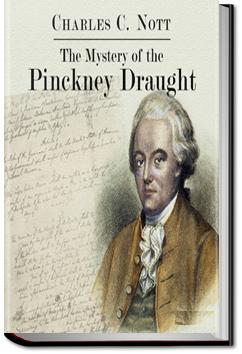UNLIMITED Audiobooks and eBooks
Over 40,000 books & works on all major devices
Get ALL YOU CAN for FREE for 30 days!
The Mystery of the Pinckney Draught
Charles C. Nott
Book Overview:
Charles Pinckney, member of the South Carolina legislature, Confederation Congress, U.S. Congress, and notably the Constitutional Convention of 1787, may have been regarded by some as perhaps the true author of the U.S. Constitution, although most likely James Madison would vehemently argue the point. This book investigates what may, or may not have happened to the draft of the Constitution which was drawn up by Charles Pinckney and submitted to the Constitutional Convention in May of 1787, and how (or if) it differed from the Constitution which was adopted. The questions which are delved into most deeply revolve around the following mystery: why, if, and by whom Pinckney's version of this important document was overlooked, or was it possibly destroyed intentionally (or for other reasons).
Charles Pinckney, member of the South Carolina legislature, Confederation Congress, U.S. Congress, and notably the Constitutional Convention of 1787, may have been regarded by some as perhaps the true author of the U.S. Constitution, although most likely James Madison would vehemently argue the point. This book investigates what may, or may not have happened to the draft of the Constitution which was drawn up by Charles Pinckney and submitted to the Constitutional Convention in May of 1787, and how (or if) it differed from the Constitution which was adopted. The questions which are delved into most deeply revolve around the following mystery: why, if, and by whom Pinckney's version of this important document was overlooked, or was it possibly destroyed intentionally (or for other reasons).
How does All You Can Books work?
All You Can Books gives you UNLIMITED access to over 40,000 Audiobooks, eBooks, and Foreign Language courses. Download as many audiobooks, ebooks, language audio courses, and language e-workbooks as you want during the FREE trial and it's all yours to keep even if you cancel during the FREE trial. The service works on any major device including computers, smartphones, music players, e-readers, and tablets. You can try the service for FREE for 30 days then it's just $19.99 per month after that. So for the price everyone else charges for just 1 book, we offer you UNLIMITED audio books, e-books and language courses to download and enjoy as you please. No restrictions.
"Monday, March 17, 1783.
"A letter was received from General Washington, enclosing two anonymous and inflammatory exhortations to the army to assemble, for the purpose of seeking, by other means, that justice which their country showed no disposition to afford them. The steps taken[Pg 55] by the general to avert the gathering storm, and his professions of inflexible adherence to his duty to Congress and to his country, excited the most affectionate sentiments towards him. By private letters from the army, and other circumstances, there appeared good ground for suspecting that the civil creditors were intriguing, in order to inflame the army into such desperation as would produce a general provision for the public debts. These papers were committed to Mr. Gilman, Mr. Dyer, Mr. Clark, Mr. Rutledge, and Mr. Mercer. The appointment of these gentlemen was brought about by a few members, who wished to saddle with this embarrassment. . . Read More
Try now for FREE!

"Love your service - thanks so much for what you do!"
- Customer Cathryn Mazer
"I did not realize that you would have so many audio books I would enjoy"
- Customer Sharon Morrison
"For all my fellow Audio Book & E-Book regulars:
This is about as close to nirvana as I have found!"
- Twitter post from @bobbyekat


